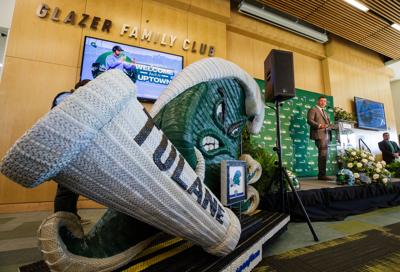Jon Sumrall is going places.
It doesn’t take long to recognize the new Tulane football coach has the “it” factor.
He had the standing-room-only crowd of fans, staff and alumni eating out of his hands from the moment he second-lined into the Glazer Family Club for his introductory news conference on Monday.
New Tulane athletic director David Harris said he knew Sumrall was “our guy” within minutes of their 2½-hour interview for the head coaching job last week.
Sumrall has everything that you’re looking for in a modern head coach: the looks, the presence, the resume, and just enough bravado to charm recruits, motivate donors and carry a room.
He was understandably Tulane’s No. 1 target and a no-brainer hire.
Rod Walker: Jon Sumrall perfect fit for Tulane, says coach who gave him a chance
“He checked every box with us for this search,” Harris said Monday.
Tulane was in a similar position almost exactly 25 years ago when it needed to replace another highly successful head coach.
When Tommy Bowden left for the bright lights and big paycheck of Clemson, the obvious choice to replace him was in-house. Offensive coordinator Rich Rodriguez orchestrated the prolific offense that propelled the Green Wave to a 12-0 record and Liberty Bowl victory. He was considered one of the brightest offensive minds in college football and a rising star in the profession.
But many at Tulane were concerned that Rodriguez would use Tulane as a steppingstone to a bigger job. So school officials bypassed Rich Rod to hire Chris Scelfo, a Louisiana native who officials hoped would make New Orleans his home and become a legacy hire at the school.
It was a short-sighted, ill-fated move that sent a message to the rest of the sport that Tulane wasn't serious about football. Scelfo had two winning seasons in eight years, and the program wandered the desert of mediocrity for nearly 20 years before Willie Fritz came to the rescue in 2016.
Wisely, Tulane did not repeat the same mistake this time around.
The search committee — led by Harris, president Michael Fitts, chief operating officer Patrick Norton and deputy AD Kortne Gosha — recognized there was a potential catch-22 in hiring someone with Sumrall’s ambition and pedigree. They know he played and coached in the Southeastern Conference. They saw he was on the radar of Mississippi State and Duke officials when they were looking for head coaches last week.
Sumrall took over a Troy program that had experienced three consecutive losing seasons and won 23 of 27 games and two conference championships. If he enjoys similar success at Tulane, it will surprise no one if he is coaching a Power Five program in two or three years.
And that’s OK. Smart leaders know you hire good people, empower them for success and hopefully retain them if and when the time comes. The rest is out of your control.
“The temptation can be to try to find a candidate that you think can have success and that you predict will be here a long time, but you can’t predict that,” Harris said. “You have no idea what’s going to happen (in the future). To me, if he is not staying long, it’s because he had success. And we want a coach that is successful.”
The reality is Tulane always will struggle to keep successful head coaches from leaving for other jobs.
It’s a much more attractive job than it was a decade ago, thanks to Fritz’s efforts and school officials’ long-overdue investments. The administration and student body are more engaged than ever. Louisiana and the Gulf Coast are fertile recruiting grounds. And Uptown New Orleans is a great place to live, work and play.
But football coaches are highly competitive people. They aspire to compete at the highest level and win championships. While the Green Wave’s path to the expanded College Football Playoff is more easily navigable than many Power Five programs, the job still lacks the resources and prestige of most SEC, Big Ten and Big 12 jobs.
The goal is to eventually change the program from a launching pad to a landing spot. To reach that point will take time and commitment. Until then, Tulane needs to do what it did with Sumrall, and, as Harris said, “hire the very best person for the position and try to surround him with resources and people and things that they need so that they want to stay here for a long time and make this their home and really invest in being here.”
Success breeds success. If Sumrall wins and leaves for greener pastures, then Tulane will continue to be viewed favorably by aspiring coaches. Eventually, who knows, maybe one of them likes it so much he elects to stick around and becomes Tulane’s football’s version of Mark Few at Gonzaga.
You can't be short-sighted in making big decisions. As Sumrall said Monday, you win in the long run by doing things the right way.
In hiring Sumrall, Tulane showed it learned its lesson from past mistakes and is serious about football. As a result, the future of the program remains bright.
Sumrall wasn’t just the right choice for the job, he was the only choice.


